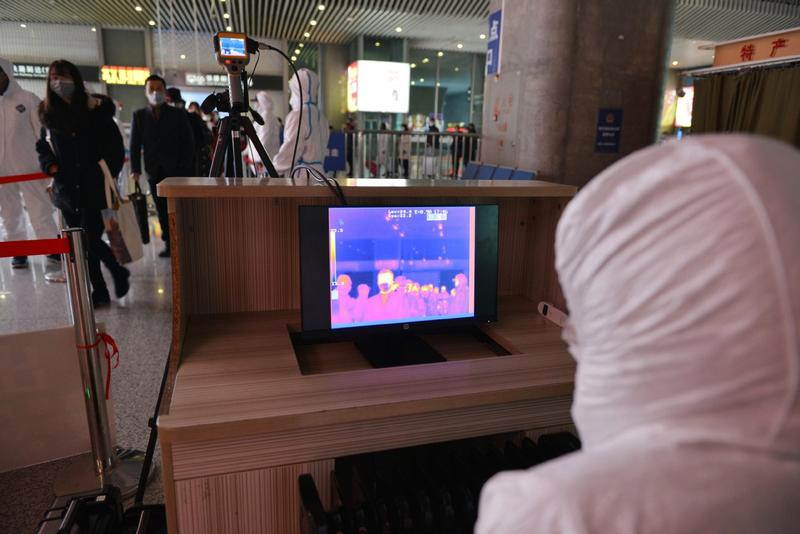 A staff member uses an infrared thermometer to measure body temperature at the Nanjing South Station, on Feb 4, 2020. (PHOTO / XINHUA)
A staff member uses an infrared thermometer to measure body temperature at the Nanjing South Station, on Feb 4, 2020. (PHOTO / XINHUA)
While infrared thermometers are now used in most subway stations in China to prevent the spread of novel coronavirus pneumonia, the device is not seen at Mudanyuan station on the Beijing subway's Line 10.
The station uses an artificial intelligence based fever screening system. Developed by Beijing-based Megvii and put into use on Tuesday, it supports non-contact remote temperature screening from a distance of 3 meters.
The system's margin of error is within 0.3 degree Celsius, said Liu Ruiwei, a senior product manager of Megvii. It can send fever alerts for up to 15 people per second. Even for the subway stations with greater traffic, only one employee is required to work on-site, further reducing the risk of infection, he said.
The AI algorithm should be further optimized to help with the research of the gene sequencing of the virus and the development of vaccines and drugs, said the Ministry of Industry and Information Technology
"In light of the large group of returnees to major cities after the extended Spring Festival holiday, we built a team of about 100 people before Chinese Lunar New Year to develop the system. With the help of AI technology, we can track the whereabouts of people with fever as well as their close contacts," said Liu.
ALSO READ: Jack Ma pledges US$14.5 million to help fight coronavirus
On Tuesday, the Ministry of Industry and Information Technology suggested in a public note that AI companies should work together to come up with solutions to discover, prevent and control NCP. More application scenarios should be explored and products that help with diagnosis and rapid testing should enter mass production.
The AI algorithm should be further optimized to help with the research of the gene sequencing of the virus and the development of vaccines and drugs, said the ministry.
According to Beijing-based market research firm EO Intelligence, medical imaging is the sector where AI technology has been embedded the most. As EO Intelligence has calculated, there were 126 medical AI providers active in the Chinese market by July 2019, with 57 specializing in medical imaging.
Established in 2012, Shanghai-based Yitu Technology Co started to study AI-based medical imaging systems in 2016. The intelligent medical imaging evaluation system developed by Yitu has been operating at the Shanghai Public Health Clinical Center since Jan 28 to help with the diagnosis of NCP.
The evaluation system is able to perform a quantitative analysis of the lungs with the help of artificial intelligence and suggest therapy options. This in turn allows doctors to make faster, more accurate decisions.
READ MORE: Tech companies donate funds, medical supplies and equipment
Shi Yuxin, deputy head of the Shanghai Public Health Clinical Center, said that CT imaging is an important reference for the diagnosis and treatment of NCP. The recently introduced AI system can classify the pneumonia caused by the virus according to its severity, precisely calculate the burden on the lungs and provide 4D dynamic pathology comparisons.
Traditional quantitative analysis performed by humans would usually require up to six hours. The new AI system is able to perform the same task in just three seconds or less.
To date, the Shanghai Public Health Clinical Center has used the system to diagnose more than 70 cases of pneumonia caused by the novel coronavirus. The results generated have been highly reliable and similar to those produced by doctors.
In addition, the system has also been installed in hospitals where the contagion is relatively more serious, including the Union Hospital affiliated with Tongji Medical College of University of Science and Technology, Renmin Hospital of Wuhan University, Zhongnan Hospital of Wuhan University and the First Affiliated Hospital of Wenzhou Medical University.
Yitu Technology Co Ltd said that it is willing to perform free installations and upgrades of its imaging products at hospitals designated to treat patients infected with the novel coronavirus.
The stock market has responded positively to the use of AI technology in the fight against NCP.
According to Shanghai-based market tracker Wind Info, the A-share market's AI sector reported growth for four consecutive days since Tuesday. Shanghai-based AI technology provider Montage Technology, one of the first companies listed on the technology-focused STAR Market, saw its price surge 40 percent over the trading week starting from Feb 3. Hikvision, the AI solutions provider with the largest market capitalization, also saw its share price rise 8 percent during the same period.
Fang Cong, vice-president of Yitu's medical business, pointed out that application in clinical environments is essential to the development of AI technology, adding that, as the industry matures, only those addressing true market demand will see sustained development.
Contact the writers at shijing@chinadaily.com.cn


